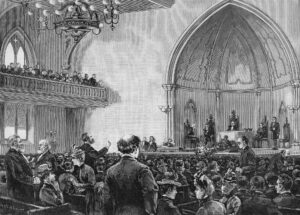In a previous article, I offered a brief history of Protestant reflection on the right of resistance to unjust rule. Here, I want to discuss how these principles might apply to the present circumstance—in which many churches are fighting back against pandemic restrictions on their freedom of worship. How might we think about whether, when, and how to resist as faithful Christians in such a time?
Today’s Lesser Magistrates
Well, the first point that we must make is that the distinction the Reformers drew between private citizens and “lesser magistrates” remains just as important now as then. Many people today seem to think that “the rule of law” means that any citizen should feel free to disobey any order he deems unlawful, or law he deems unconstitutional.
We have seen this many times in recent months, particularly in the United States: individuals or churches, concluding that their governors do not actually have authority to require mask-wearing or limit gathering sizes, have not followed such orders. When reminded of Romans 13, they respond that they are “being subject to the governing authorities”—namely, the laws and constitutions. But this turns the great project of constitutionalism into a recipe for anarchy.
Even the most participatory system of government vests the authority to interpret the laws in specific individuals and institutions. If “the rule of law” meant that every citizen could make up his or her own mind about what the law meant, or which laws were valid, there would soon be neither rule nor law.
For Christians convinced that certain government actions represent an overreach of the government’s own laws, the proper course of action is to appeal to the courts—the “lesser magistrates”—for protection. (To be sure, sometimes the most straightforward way to do so is to disobey in a pointed fashion so as to force the legal issue, but this should be done with great care and humility.)
But what if the courts fail us?
But what if the courts fail us? After all, they are not infallible, and if we are unfortunate enough to live under a deeply corrupt regime, they may in fact be part of the problem, not part of the solution. Even here, Scripture and the Christian moral tradition suggest that usually in such cases, we should submit even to what we deem an unjust sentence.
As Richard Hooker pointed out in response to just this question, God himself required the people of Israel to appeal their cases to human judges, and to submit humbly to those judges’ decisions: “According to the instructions that they give you, and according to the decision which they pronounce to you, you shall do. You shall not turn aside from the verdict that they declare to you, either to the right hand or to the left. The man who acts presumptuously by not obeying the priest who stands to minister there before the Lord your God, or the judge, that man shall die” (Dt. 17:11-12). Surely there were times, remarks Hooker, when individual Israelites were convinced that the judges had ruled unjustly, but God still enjoins submission—otherwise, “we will never avoid confusion or reach a lasting peace” (Laws, Preface.6.3).
“We must obey God rather than men”
Still, though, there is always that crucial proviso: “We must obey God rather than men” (Acts 5:29). There is some point at which we must defy even the highest earthly court—and indeed some point at which we do not even need to waste time appealing to the courts: when we are required to disobey God’s clear commands. For many Christians, now is such a time. But is it? Individual circumstances and local restrictions vary widely, so I will not attempt a general answer. But I will offer three principles that might help us answer this question.
[T]here is a crucial difference between an unjust law and a law that requires us to do injustice.
The first thing we must realize is that there is a crucial difference between an unjust law and a law that requires us to do injustice. Consider, for instance, the difference between a legal regime that permits abortion, and a law that requires all doctors to perform abortions. While Christians might strenuously object to both, only the latter forces the “We must obey God rather than men” dilemma.
We might be tempted to think—and some more incautious Christians have occasionally suggested—that a government that legalizes abortion thereby forfeits its authority, because it has failed in its basic duty to provide justice. But if we applied this standard consistently, few regimes in all history would retain lawful authority. Indeed, Christians have historically insisted on the need to comply with laws that even indirectly implicate Christians in injustice.
Consider, for instance, countries that support abortion procedures with taxpayer dollars. We might suppose that in such a case we must refuse to pay taxes to avoid collaborating with evil. But does that mean that a Christian must refrain from paying taxes whenever he thinks that any of his taxes are being used for an unjust purpose? If so, again, almost every regime in history would lose its authority to tax, and Paul seems to forestall such reasoning in Romans 13:7.
Christian ethicists have accordingly distinguished between different forms of cooperation with evil and reserved outright resistance for cases where the Christian is called upon to personally act in violation of God’s commands. A Christian thus might, for instance, think that the government is wrong to enjoin mask-wearing; but since wearing a mask is not in itself sinning, he may still be obliged to comply.
The second point, however, is that we must recognize there is an asymmetry between what God commands and what he forbids. What do I mean? Well, consider the present situation. Some have argued that since God commands the church to gather in person for worship, we must obey God and disobey a civil authority who forbids us to do what God commands—just as we must disobey a civil authority who commands us to do what God forbids (e.g., abortion). This seems obvious at first glance, but a second glance is needed.
Consider: God commands us to eat (not in so many words; but we obviously have a moral responsibility to sustain ourselves in life and health). A parent might send a disobedient child to bed without supper, forbidding them from eating for a time. Must the child obey God (eat!) rather than his parent (do not eat!)? Well, no, because the God-given command to eat leaves us at discretion (and potentially subject to human authorities) on when to eat. A divine prohibition is in force always—you must at all times refrain from doing what God has forbidden. But you cannot, by definition, at all times do something God commands.
Even “pray without ceasing” cannot be intended literally, or we would never do anything but pray. Accordingly, when God commands us to gather in person for worship, he does not tell us when to do so—weekly on Sundays is an ancient and venerable custom, but it is hardly free from exceptions. Circumstances may conspire to prevent us from carrying out this command on certain occasions (e.g., you should probably not drive to worship in the midst of a blizzard).
It is thus entirely possible that the civil magistrate could temporarily prohibit that which God commands, without creating a crisis of Christian obedience. It depends on whether the prohibition is reasonable, well-grounded, and adopted as a matter of last resort.
We are all fallible
So then, may we resist a governing authority that prohibits us from carrying out our ordinary duties, if that prohibition is hasty, unnecessary, or unreasonable? Well yes, but still, not so fast. We must remember that just because I think that something is hasty, unnecessary, or unreasonable does not mean it is.
Precisely because our own judgments are limited and fallible, we can and should lean upon the wisdom of governing officials tasked with interpreting and upholding the laws.
Government is fallible, but so are we—including churches and pastors. When we are in the realm of merely probable reasoning—e.g., what are and aren’t the best ways to mitigate a pandemic—we need to be realistic about our own limitations and beware jumping to categorical conclusions. To invoke God’s commands in support of our own private judgments can be a form of violating the Third Commandment. This, then, is another reason why we should be thankful for “the lesser magistrate.” Precisely because our own judgments are limited and fallible, we can and should lean upon the wisdom of governing officials tasked with interpreting and upholding the laws.
We can and should appeal to those in authority for relief if we question the wisdom or justice of their commands. We can and should appeal to the courts if we question the lawfulness or constitutionality of orders we are facing. We can and should insist on the authority of the rule of law, even while remembering that it cannot and will not give us perfect justice. Only God can do that, but we can nonetheless gratefully praise him for ordaining the powers that be as agents of relative justice and order in a disorderly and sinful world.





















